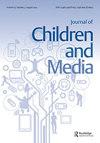Programming girlhood: digital labor and the twenty-first century girl coder in the United States
IF 2.1
3区 心理学
Q2 COMMUNICATION
引用次数: 1
Abstract
ABSTRACT There has been a marked rise in U.S. clubs and television programs promoting coding for young girls. These clubs and television shows position girls as either benefiting economically through the figure of the “can-do girl” or potentially failing as an “at-risk girl.” This article looks at two iterations of the girl coder – in Nickelodeon’s 2015 sitcom Game Shakers and in the rhetoric of Black Girl CODE and Girls Who Code – placing them within broader understandings of girlhood, economics, race, and labor. This analysis reveals the ways in which girl programmers become attached to racialized economic imaginings in these two instances either as idealized white child workers in the case of Game Shakers or future Black computer scientists within coding clubs. This positioning intimately ties girl programmers to economics, labor, and neoliberal ideals; however, this paper proposes that we need to imagine other possible goals for the girl programmer, particularly for Black and Brown girls. IMPACT SUMMARY a. Prior State of Knowledge: Since 2010 there has been a push to get girls into computer coding with particular attention paid to the pipeline problem. This rhetoric has been both touted and questioned. b. Novel Contributions: This article adds a critical look at how Black and Brown girls are positioned within computer programming initiatives and discourses using two primary case studies. It then offers a non-future oriented way of considering computer coding for girls. c. Practical Implications: This project suggests that researchers must continue to pay attention to the nuances of raced neoliberal capitalism in studies on girl’s media even as initiatives are widely considered positive.编程少女时代:数字劳动与美国21世纪的女孩程序员
摘要:美国俱乐部和电视节目中为年轻女孩宣传编码的现象明显增多。这些俱乐部和电视节目将女孩定位为要么通过“能干女孩”的形象从经济上受益,要么作为“高危女孩”可能失败,经济、种族和劳动力。这项分析揭示了在这两种情况下,女程序员对种族化的经济想象产生依恋的方式,无论是在Game Shakers中,还是在编码俱乐部中,成为理想化的白人童工。这种定位将女程序员与经济、劳工和新自由主义理想紧密联系在一起;然而,本文提出,我们需要想象女程序员的其他可能目标,特别是黑人和棕色人种的女孩。影响总结a.先前的知识状况:自2010年以来,一直在推动女孩学习计算机编码,并特别关注管道问题。这种言论既受到吹捧,也受到质疑。b.新颖的贡献:本文通过两个主要案例研究,对黑人和棕色人种女孩在计算机编程倡议和话语中的定位进行了批判性的审视。然后,它提供了一种非面向未来的方式来考虑女孩的计算机编码。c.实际意义:该项目表明,研究人员必须在对女孩媒体的研究中继续关注种族新自由主义资本主义的细微差别,即使这些举措被广泛认为是积极的。
本文章由计算机程序翻译,如有差异,请以英文原文为准。
求助全文
约1分钟内获得全文
求助全文

 求助内容:
求助内容: 应助结果提醒方式:
应助结果提醒方式:


